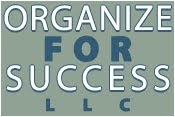 Whether it's paper or electronic, a single solution enables tracking all commitments (personal & professional) in one place, making it less likely that appointments will be forgotten or that you will double-book. However, how do you make a calendar really operate as a tool to encourage your great success? Here are tips to best utilize a calendar:
Whether it's paper or electronic, a single solution enables tracking all commitments (personal & professional) in one place, making it less likely that appointments will be forgotten or that you will double-book. However, how do you make a calendar really operate as a tool to encourage your great success? Here are tips to best utilize a calendar:1. Use what works for you. Test options to see if your personality meshes best with daily, weekly or monthly and whether paper or electronic is best for you. Find more about the process at http://bit.ly/fkOMOO.
- Electronic calendars give you the option of setting alerts for upcoming events, which is ideal if you tend to forget birthdays, anniversaries or leaving for meetings and appointments. Look for repeat features that let you input daily, weekly, monthly or annual data only once.
- Paper calendars often allow for more easily viewing the entire month at one glance, and the fact that you can write in whatever size you choose enables you to decide how much information fits within each date's box.
2. Color-code your calendar. To have one calendar tool for all facets of your life, use different colors for each (work vs family vs friends vs fitness vs self). Or use a different color for each project being completed, role you fill, person for whom you are responsible or different area of responsibility within your job. Visual cues, like colors, are great for driving action, particularly so you can tell what needs to be done by simply glancing at your calendar solution.
3. Include all pertinent details for each entry. When adding an appointment to your calendar tool, insert the phone number next to the name of the person you are meeting so, if you're running late, you can easily call. Plus, make sure to include the who, what, when, where and why beside each appointment being scheduled on your calendar.
4. Track to-do items amidst appointments. A calendar solution can be so much more than just a place to track appointments. To use your tool most effectively, assign a "when" for each "what" on your to-do list. I have yet to find a "someday" on any calendar, but I have seen how tasks with times scheduled for getting done are completed more regularly.
5. Always expect the unexpected. If you know precisely how long something should take, schedule it in your calendar with a 15-minute or greater buffer. You never know when traffic or another hurdle will delay your plans so approach proactively.
What techniques do you use to maximize your calendar's effectiveness? Please share in the Comments section below.

No comments:
Post a Comment